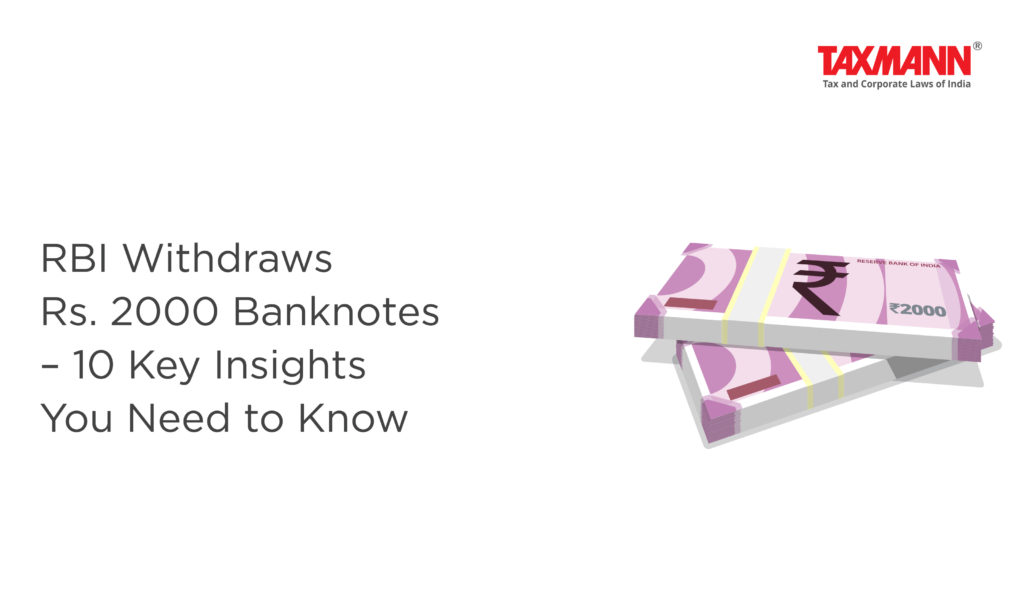RBI Withdraws Rs. 2000 Banknotes – 10 Key Insights You Need to Know
- Blog|FEMA & Banking|
- 3 Min Read
- By Taxmann
- |
- Last Updated on 20 May, 2023

Table of Contents
1. Introduction
2. Comments
1. Introduction
In pursuance of the “Clean Note Policy”, the RBI has decided to withdraw the Rs. 2000 denomination banknotes from circulation. The banknotes in Rs. 2000 denomination will continue to be legal tender. The exchange of Rs. 2000 notes into banknotes of other denominations can be made upto Rs. 20,000 at a time from May 23, 2023. Banks have been directed to provide deposit and/or exchange facilities for Rs. 2000 banknotes until Sep 30, 2023. Here are 10 key things to know about the withdrawal of the Rs. 2000 bank notes from circulation:
- Legal Tender: The Rs. 2000 banknotes continue to be legal tender till Sep 30, 2023
- Time limit: RBI has directed banks to provide deposit and or exchange facilities for Rs. 2000 notes until Sep 30, 2023
- Banks not to issue Rs. 2000 notes: RBI has advised banks to stop issuing Rs. 2000 notes with immediate effect
- Use of Rs. 2000 note for transactions: The public can continue to use Rs. 2000 notes until Sep 30, 2023
- Where to deposit?: Facility for deposit of Rs. 2000 notes will be available at all banks and Regional offices of RBI until Sep 30, 2023.
- Operational limit: The public can exchange up to a limit of Rs. 20,000/- at a time.
- Effective date for exchange facility: The exchange facility will begin on May 23, 2023
- Exchange facility can be availed by non-customers (non-account holders): Non-account holders can also avail of the facility for the exchange of rs. 2000 banknotes from any branch
- Exchange facility is free: The exchange facility will be provided free of cost
- Business correspondents1 (BC) can also provide an exchange facility: Exchange of Rs. 2000 banknotes can be through BCs up to a limit of Rs. 4000/- per day for account holders.
2. Comments
The RBI’s decision to withdraw the circulation of Rs. 2000 banknotes as part of the Clean Note Policy demonstrates the central bank’s dedication to maintaining an efficient and streamlined currency system. By aligning the available denominations with transaction trends, the RBI aims to ensure the public’s currency needs are effectively met while maintaining an ample supply of banknotes.
The introduction of Rs. 2000 banknotes in 2016 served a crucial role in addressing the immediate currency requirements following the demonetization of Rs. 500 and Rs. 1000 notes. However, over time, the usage of these high-denomination banknotes has significantly declined, prompting the need for reassessment.
As stated by the RBI, approximately 89% of Rs.2000 banknotes were issued prior to March 2017 and are nearing the end of their estimated lifespan of 4-5 years. The total value of Rs. 2000 banknotes in circulation has decreased to Rs. 3.6 lakh crores, accounting for only 10.8% of the overall notes in circulation as of March 31, 2023. Consequently, the impact of this withdrawal on the economy is expected to be minimal.
The RBI has provided a generous window until September 30, 2023, for individuals to exchange or deposit their Rs. 2000 banknotes and Rs. 2000 bank notes continue to be a legal tender till then. This timeframe allows for an adequate transition period.
Considering the rising prevalence of digital transactions, the discontinuation of Rs. 2000 banknotes is unlikely to have a significant impact on the average individual’s day-to-day transactions. However, it may specifically target unaccounted cash transactions conducted within the parallel economy.
- Business Correspondents (BCs) are individuals or entities appointed by banks under the guidelines of the Reserve Bank of India (RBI) to provide banking services at locations where setting up a brick-and-mortar branch is not viable
Disclaimer: The content/information published on the website is only for general information of the user and shall not be construed as legal advice. While the Taxmann has exercised reasonable efforts to ensure the veracity of information/content published, Taxmann shall be under no liability in any manner whatsoever for incorrect information, if any.

Taxmann Publications has a dedicated in-house Research & Editorial Team. This team consists of a team of Chartered Accountants, Company Secretaries, and Lawyers. This team works under the guidance and supervision of editor-in-chief Mr Rakesh Bhargava.
The Research and Editorial Team is responsible for developing reliable and accurate content for the readers. The team follows the six-sigma approach to achieve the benchmark of zero error in its publications and research platforms. The team ensures that the following publication guidelines are thoroughly followed while developing the content:
- The statutory material is obtained only from the authorized and reliable sources
- All the latest developments in the judicial and legislative fields are covered
- Prepare the analytical write-ups on current, controversial, and important issues to help the readers to understand the concept and its implications
- Every content published by Taxmann is complete, accurate and lucid
- All evidence-based statements are supported with proper reference to Section, Circular No., Notification No. or citations
- The golden rules of grammar, style and consistency are thoroughly followed
- Font and size that’s easy to read and remain consistent across all imprint and digital publications are applied




 CA | CS | CMA
CA | CS | CMA
